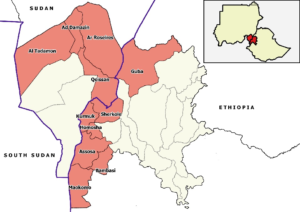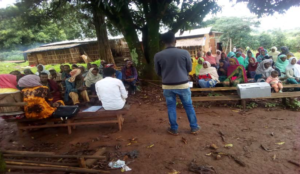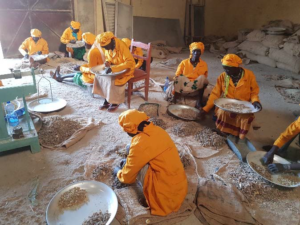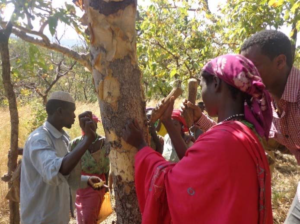Introduction: Magnitude and Scope of Gender Inequality in Ethiopia
In Ethiopia, 80 percent of the population resides in rural areas and women provide most of the
agricultural labour in these communities. However, their contributions often go largely
unrecognized and their fathers or husbands often restrict access to resources and community
participation. Worse, one in three women experience physical, emotional or sexual violence. 65
percent of women have experienced female genital mutilation, and only half of girls who enrol in
primary schools ever make it to grade 5.
In the Benishangul-Gumuz Regional State, a region located in the western part of Ethiopia
bordering with Sudan, women and their households are engaged primarily in subsistence
agriculture which is often labour-intensive and exacts a heavy physical toll. In such a countryside,
there is a high rate of gender inequality and women inferiority. For example, most of the women
in this area are working in farming and gold mining. However, with no influence over her very
moderate income, women are completely reliant on their husbands who have the ultimate say over
how household money is being spent. Because of this, women often face various economic
constraints, including almost no access to financial services or credits and with limited market
access, the women in these communities do not have any economic and income-generating
opportunities.
Objectives of the Cross-Border Collaboration Programme in Western Ethiopia and Eastern Sudan
The Cross-Border Collaboration Programme in Western Ethiopia and Eastern Sudan (CBCES) is
commissioned by the European Union and the German Federal Ministry for Economic
Cooperation and Development. It aims to develop and enhance economic opportunities, reduce
Cross-Border Collaboration Programme in Western Ethiopia and Eastern Sudan
conflicts and improve overall living condition in the border area of Benishangul-Gumuz Regional
State, Ethiopia and Blue Nile State, Sudan. This includes helping communities to better withstand
shocks such as harvest failures and peacefully resolve communal conflicts. We are also aiming at
strengthening the populations resilience to instability and displacement, improving basic
infrastructure and services, developing vocational and entrepreneurship skills and, ultimately,
strengthening trans-boundary cooperation. As one of its focus, the Programme targets the
economic needs of young people and women.
CBCES is working to empower women and girls in the border area of Western Ethiopia and
Eastern Sudan. Therefore, the Programme is promoting equal access to education and health
services as well as creating economic opportunities, particularly for women and youth.
How CBCES promotes Gender Equality: Creating Saving Groups and Improving Income-Generating Opportunities
In our Programme, we are promoting gender equality in different aspects: Starting with our
Programme staff, we are strictly adhering to the overall GIZ policy on banning sexual harassment
at the workplace, including anti-sexual harassment trainings. In our Programme implementation,
we are working to promote gender equality for our beneficiaries in the communities especially
through our local implementing partners (World Vision Ethiopia and Farm Africa). As one major
effort, we help women in vulnerable communities to organize in a total of five saving groups to
make them more economically independent. Each of the five saving has 25 members, i.e. 125
women have been organized in saving groups until now.
Our Programme is not only working with saving groups. We are also promoting gender equality
through income-generating activities for women, e.g. on incense tapping. These trainings have
already started as shown in the pictures below:
The support to organize in savings groups as well as the trainings on creating income-generating
opportunities improve women’s daily life in various aspects:
Appreciation of the central role of women in their families and communities;
Gender norms and biases are challenged, e.g. leading to sharing of responsibilities of
household chores such as taking care of children;
Women are encouraged to stand up against harassment, domestic violence and inequality
and openly speak their mind without fearing consequences;
Women are empowered to become leaders and mentors for their communities as well as
for each other.
Our Collaborative Approach
In the medium and long-term implementation of the Programme, we expect an even bigger change
and improvement of vulnerable women’s daily life in these rural communities. However, gender
equality cannot be achieved individually nor by one Programme alone. It needs collaboration of
many individuals, organizations and communal society itself. Therefore, our Programme
cooperates with the Ethiopian Government, namely with the Regional Bureau of Children and
Women Affairs as well as with our implementing partners World Vision Ethiopia and Farm Africa.
Personally, I have been working to solve gender inequality and promote gender equality starting
from my childhood. I was born in a community with a culture of women inferiority and men
superiority. I was deviant for that culture starting from my family. I am proud to say that I was
finally able to change that attitude within my own family: these changes for gender equality came
evolutionally not revolutionally. Also, while in university, I taught some courses on gender and
social work for 1st and 2nd year students: I tried different approaches to bring gender equality like
getting community support, understanding girls’ physiological needs and creating a feminist
culture. Now in my professional career, I am using this knowledge and experience to make a
difference for gender equality!

 GIZ Gender Website
GIZ Gender Website


